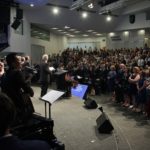This past Sunday I got the opportunity to discover first hand leading worship in light of a 6.1 magnitude earthquake. While the earthquake occurred in a different city to us, with New Zealand being the small country it is, many people in our church had indirect or direct links to those affected. It was definitely a different mood to a normal Sunday service.
In between being glued to the live news updates and trying to prepare for the service, God taught me a number of new lessons this week. They’re not original, brand-new insights that no one’s ever thought of before, but they’re lesson I need to learn myself over time. My prayer is that some of this might be useful not just for those leading gathered worship, but also for those participating in it; not just following times of human tragedy, but during other trials, and on normal worship services too.
1. The church needs to sing songs of lament.
If our music repertoire was wholly comprised of upbeat, optimistic praise songs that made no mention of trials/grief/sorrow, in the midst of tragedy we’d have no songs that would adequately recognise suffering in this life, direct our faith and trust to the Great Comforter, or point us towards an eternal hope. A quick read through the titles in the book of Psalms quickly reveal a very broad range of emotions being expressed: joy, grief, anger, sorrow, all in faithfulness to God. Our vocabulary of worship songs should have that same spread.
I’m thankful that at HBC we’ve learnt a number of songs that address the realities of pain and suffering, we could probably benefit from having more. In addition to great hymns like “The Solid Rock“, “It Is Well With My Soul“, “Great Is Thy Faithfulness“, “O God Our Help In Ages Past“, our church know and sing newer ones such as “Blessed Be Your Name“, “There Is A Hope” and “As Long As You Are Glorified“.
But I think we can still grow in this area. I’ve been given a number of good suggestions from various sources that other people have used. Hopefully we’ll get to introduce them to the church over time, Lord willing. Here are some of them:
- God Moves In a Mysterious Way – William Cowper (Sovereign Grace arrangement)
- Desert Song – Brooke Fraser
- We Have Sung Our Songs (How Long) – Stuart Townend
- When Trials Come – Keith and Kristyn Getty
Of course, there’s also a rich heritage of hymns with a good selection of songs about suffering. A good hymn book should list these out in the theme index.
2. Be slow to speak, especially about why.
Since Tuesday, Christians and non-Christians across the country have been asking the question “Why did the earthquake in Christchurch happen?”. If Facebook and the public media is anything to go by, everyone’s got their two cents about the problem of evil in this world. My primary job as a worship leader is to use biblical truth and music to encourage the gathered church to join in praising God – so most of my focus should be on that, rather than giving my own answer about this topic.
I’m not saying here that during the worship service we shouldn’t mention anything about this issue, the elephant in the room – that would be irresponsible. But if you can, rather let your pastor or the speaker address it – especially if you’re not completely certain yourself about what the Bible would teach us about God’s sovereignty and love in light of moral and natural evil.
In the end, most of my speaking was done in between songs to highlight scripture passages that speak of the Lord’s comfort for us in troubled times (Hebrews 12:28, 2 Cor 1:3, 1 Thess 4:13-8).
As a worship leader, if you find that you’re spending five minutes explaining the meaning of a passage or a truth from a song, then it’s better left to a sermon from your pastor (and this may be applicable for any given service!) What you say should motivate the church to fix their eyes upon God, rather than put the focus on yourself. As John the Baptist wisely stated: “He must increase; I must decrease.” (John 3:30)
3. Don’t do it all on your own.
As the seriousness of the disaster quickly became apparent, it was almost tempting to be overwhelmed by the enormity of the situation. It was helpful to get some perspective from others who’ve experienced trials, but also just other people to sound ideas off. I benefitted greatly from meeting with my pastors to sensitively work through the details of the service. In addition, I looked on the web to see how the Christian world responded to similar circumstances. Haiti. Hurricane Katrina. In particular, if there were insights on leading worship services in light of those situations.
There were two online resources in particular that helped give me a better framework on the practical aspects of leading a service in light of trials, and — more importantly — ministered to my soul by encouraging me to seek Him as the source of comfort and strength amidst my own weakness:
- Redeemer Presbyterian Church of New York have an audio recording of the Sunday service following the September 11th terrorist attacks. It was a service that mixed a good selection of scripture readings (Psalm 4, Psalm 27, Isaiah 61, Psalm 46, Romans 8:14-38), singing, and a message that helped to address many of the questions I had in my mind on God’s goodness and sovereignty. I found it most moving to hear a man, choked with tears, declare from Isaiah 61:1-11 that “They shall build up the ancient ruins;they shall raise up the former devastations;they shall repair the ruined cities…”
- Bob Kauflin wrote about how he was able to lead his church in singing God’s praise even as he was going through his own personal trials. The songs for Sunday couldn’t be changed, so instead he changed his response, to “draw great comfort from God through the truths we sang.” He made this great point, which I’ll quote:
We don’t lead others out of a vacuum or a sanitized form of Christianity that bears no resemblance to normal life. It’s important that we take time to grieve, acknowledge pain, and confess our struggles. But when, not if, you find yourself leading out of weakness, challenges, and trials, don’t minimize what’s going on or succumb in despair to your burdens. Lift your eyes, even as you lift the eyes of others, to the Father whose compassions never fail and to the Savior whose mercies are new every morning.
Whether God changes our trials, or more importantly, changes usthrough our trials, we praise him now in joyful anticipation of the day he will wipe away every tear from our eyes (Rev. 21:4).
For those of us in the younger generation, we need to heed the wisdom of those who have gone before us. After all, suffering is an age-old issue that generations of Christians have had to deal with.
And even more so, it’s times like these that we’re reminded of our continual need to lift our eyes to the Father. He’s the one who ultimately equips us with what’s needed to serve Him – even if it’s leading worship after an earthquake.
—————————–
– William






The prayer and thought and time put into Sunday’s service paid off (again!) It was noticable. I spoke briefly with the director of World Vision who was visiting us that day and he was completely taken by it – “it was very moving – most appropriate in light of the situation” – or words to that effect. Good point about the songs of lament – I hadn’t really thought that through but I think you are right. “God Moves in Mysterious Ways” is a great song – it would be good to familiarize our congregation with it more. It would have been a good fit.
Thanks for this William!
Blessings in Christ,
Joe